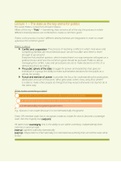Samenvatting
POLDIM Summary
A full summary of the lectures of the Political Dimensions of Europe. Visual/colorful, which helps me remember content better. Taught at The Hague University of Applied Sciences, year 2021/2022. My final grade was an 8.6
[Meer zien]




